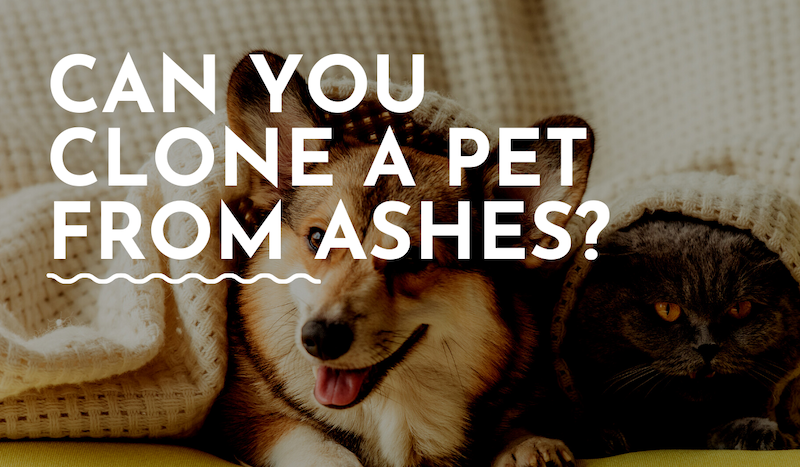If you’ve seen one too many Sci-Fi movies, chances are you may have wondered if it would ever be possible to clone your beloved pet from their ashes.
Now, while this may seem like a far-fetched idea, technological advances have made pet cloning a reality.
However, cloning a pet from ashes remains impossible, as the process requires viable DNA, which has been destroyed by the heat during cremation, leaving no building blocks to work with.
In this article, we will delve into the intricate process of pet cloning, explore the financial implications, and examine the ethical debates surrounding this technology.
We’ll also look ahead to potential future developments, providing a comprehensive overview of everything involved in bringing this extraordinary scientific feat to life.

The Science of Cloning
Cloning is a process that involves creating an exact genetic replica of an organism, and it has been used to clone various animals, including cats, dogs, and horses.
The Pet Cloning Process
Pet cloning involves taking a genetic sample, typically a skin or tissue biopsy, from a living pet.
This sample is used to extract DNA, which is then inserted into an egg cell that has had its nucleus removed.
The egg cell, now containing the pet’s DNA, is stimulated to develop into an embryo, which is implanted into a surrogate mother.
The surrogate carries the embryo to term, resulting in the birth of a genetically identical clone of the original pet.
However, while it might sound easy, the process of cloning a pet from ashes is still in its early stages, and there are many challenges scientists need to overcome before it can become a reality.
Challenges in Pet Cloning
While technically possible, pet cloning is a process riddled with challenges and considerations.
Here are some of the main factors that make the pet cloning process difficult:
DNA Preservation: Viable DNA must be preserved before a pet’s death, as cloning from ashes is not possible. This requires foresight and planning, which may not be an option for pet owners whose pets have passed unexpectedly.
Complex and Costly Procedure: The cloning process demands advanced technology and expertise, making it both intricate and expensive for pet owners.
Ethical Considerations: Concerns about the welfare of cloned animals and the potential impact on biodiversity raise significant moral questions.
Emotional Considerations: While genetics are crucial, cloned pets may not exhibit the same personality or behavior due to varying environmental influences. Therefore, grieving pet owners who have been promised a semblance of their lost companion can experience disappointment if the pet doesn’t replicate the exact personality or behavior.
The Cost of Pet Cloning
The cost of pet cloning can vary significantly, but it generally ranges from $25,000 to $50,000 or more.
This price includes complex scientific procedures, the use of advanced technology, and care for the surrogate animal.
Additionally, there may be extra costs for the storage of genetic material and any necessary veterinary care throughout the process.
Here’s a very rough estimate of how much pet cloning costs today:
| Pet Type | Estimated Cost Range |
|---|---|
| Cat | $35,000 – $50,000 |
| Dog | $50,000 – $100,000 |
| Horse | $70,000 – $100,000 |
| Exotic animal | $100,000 – $200,000 |
Current Pet Cloning Methods
There are several companies around the world offering pet cloning services, including Sooam Biotech in South Korea and ViaGen in Texas.
These companies use similar methods, primarily involving somatic cell nuclear transfer (SCNT) to clone pets, but the success rates can vary.
Here’s a brief overview of the process:
- DNA Extraction: A sample of the pet’s somatic cells, often from skin or tissue, is collected to extract DNA.
- Egg Cell Preparation: An egg cell from a donor animal is obtained, and its nucleus, which contains the genetic material, is removed.
- Nuclear Transfer: The extracted DNA from the pet is inserted into the enucleated egg cell.
- Embryo Development: The egg cell, now containing the pet’s DNA, is stimulated to begin dividing and developing into an embryo.
- Implantation: The developing embryo is implanted into a surrogate mother, who carries it to term, resulting in the birth of a cloned pet.
Ethical Considerations
Apart from challenges like uncertain success rates and financial strains, there are also ethical considerations when it comes to pet cloning.
Some argue it is a selfish act and that pet owners should instead adopt a new pet from a shelter.
Others reason it is a personal choice, and pet owners should have the right to clone their pets if they wish.
There are also concerns about the welfare of the surrogate mothers used in the cloning process.
Similarly to people undergoing IVF procedures, these animals undergo hormonal treatments and invasive procedures to prepare them for implantation.
This can make the process an incredibly stressful experience for the surrogate animal, which can even result in the loss of the pregnancy or health complications for the surrogate.
Additionally, the demands of carrying and birthing a cloned embryo can pose significant physical and emotional challenges for the surrogate, raising ethical concerns about animal welfare in the cloning process.
Finally, there are concerns about the welfare of the cloned animals themselves, as they may have health problems or abnormalities.
Cloned animals can experience a range of health issues, including developmental disorders and shorter lifespans, which raises ethical questions about the long-term viability and humane treatment of cloned pets.
In conclusion, while pet cloning is a reality today, it is not a simple process that should be taken lightly, even for those who can afford the high price tag.
And while ultimately, the decision to clone a pet is a personal one, it is still one that should be carefully considered and discussed with multiple professionals, including veterinarians, ethicists, and counselors, to address the emotional aspects and potential implications of cloning and help ensure that the decision is well-informed and aligned with the pet owner’s values and expectations.
The Possibility of Cloning Your Pet from Ashes

Cloning your beloved pet from ashes may seem like a dream come true, but is it actually possible?
Let’s explore the topic in more detail.
Understanding Ashes
When a pet is cremated, the remains are reduced to ashes.
These ashes are made up of bone fragments and other organic matter that was not completely burned during the cremation process.
While ashes may contain some DNA, it is often too damaged or degraded to be used for cloning purposes.
Feasibility of Cloning from Ashes
Despite advances in cloning technology, it is currently not possible to clone a pet from ashes.
The heat and chemical processes involved in cremation destroy much of the DNA needed for cloning.
Even if some DNA is present, it may not be enough to create a viable clone.
While it may be tempting to believe cloning from ashes is possible, it is important to understand the limitations of the technology.
Cloning is a complex and expensive process requiring high-quality DNA samples.
Without these samples, cloning is simply not feasible.
In short, while it may be emotionally appealing to consider cloning a pet from ashes, the reality is that it is currently not possible.
Ways to Memorialize Your Pet
There are many meaningful ways to memorialize your pet without resorting to cloning.
Here are a few ideas:
Create a Memory Book: Compile photos, stories, and mementos into a scrapbook or digital album to celebrate your pet’s life.
Plant a Tree or Garden: Planting a tree or creating a garden in your pet’s memory can be a living tribute that grows over time.
Commission Artwork: Have a portrait or sculpture made of your pet to keep their likeness close.
Custom Jewelry: Wear a piece of jewelry that incorporates your pet’s name, paw print, or even a small portion of their ashes.
Donation or Volunteering: Donate to an animal charity or volunteer at a shelter in your pet’s name to help other animals in need.
Create a Memorial Space: Designate a special area in your home with your pet’s belongings, photos, and a candle or light.
Write a Tribute: Pen a heartfelt letter or poem about your pet and share it with friends or on social media.
Memorial Service: Hold a small gathering with family and friends to celebrate your pet’s life and share memories.
Volunteer in Shelters: Spend time helping animals in need at a local shelter. This can be a healing way to honor your pet’s memory by giving back to other animals.
Adopt a New Pet: When you’re ready, consider adopting another pet. Providing a loving home to a new animal can be a beautiful way to continue the legacy of care and companionship your pet brought into your life.
Frequently Asked Questions

What is the success rate of pet cloning?
The success rate for pet cloning, particularly for dogs, is relatively low, with estimates of around 20%. This means that multiple attempts and procedures are often required to achieve a successful clone. Additionally, even when a clone is successfully born, there can be health issues or abnormalities.
Would cloned pets have the same lifespan?
There is no definitive answer to this question, as the lifespan of a cloned pet can vary depending on a number of factors. Some cloned pets may have a normal lifespan, while others may experience health problems or other issues that affect their longevity.
Would cloned pets be the same as your previous pet?
Cloned pets will share the same genetic material as the original pet but will likely differ in personality, behavior, and health due to environmental influences and unique experiences. While they may look similar, the bond and relationship with a cloned pet will naturally be different.
Are there any ethical concerns with pet cloning?
Yes, there are a number of ethical concerns associated with pet cloning. Some people argue cloning is an unnatural process that can lead to a number of negative consequences, such as the production of animals with health problems or other issues. Additionally, pet cloning can be potentially harmful to the surrogate animal, and many experts agree it should be avoided.